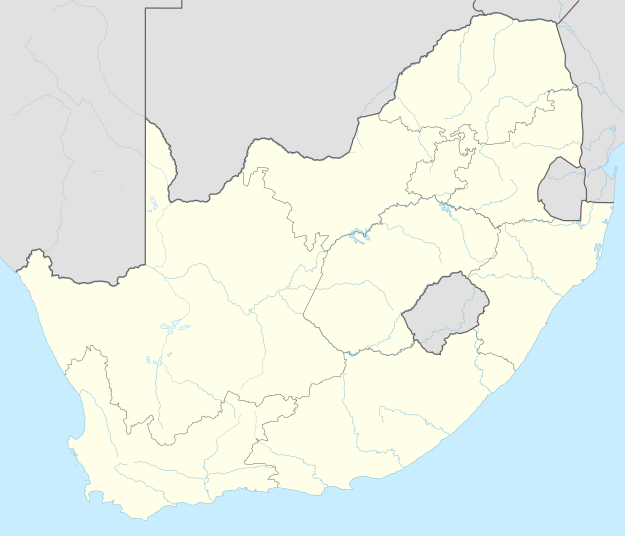Matatiele
Matatiele is a mid-sized town serving the farming and trading communities of East Griqualand in the foothills of the western Drakensberg, Eastern Cape, South Africa, on the border with KwaZulu-Natal and 20 km from the southern frontier of Lesotho. Dairy farming is the principal activity. Good trout fishing is to be had in the numerous streams of the area. As a town, Matatiele is the reference point for all of the northern Transkei.
Matatiele | |
|---|---|
 Matatiele  Matatiele | |
| Coordinates: 30°20′32″S 28°48′22″E | |
| Country | South Africa |
| Province | Eastern Cape |
| District | Alfred Nzo |
| Municipality | Matatiele |
| Area | |
| • Total | 11.20 km2 (4.32 sq mi) |
| Population (2011)[1] | |
| • Total | 12,466 |
| • Density | 1,100/km2 (2,900/sq mi) |
| Racial makeup (2011) | |
| • Black African | 83.5% |
| • Coloured | 9.5% |
| • Indian/Asian | 2.6% |
| • White | 4.1% |
| • Other | 0.4% |
| First languages (2011) | |
| • Xhosa | 48.3% |
| • Sotho | 23.5% |
| • English | 14.3% |
| • Afrikaans | 7.5% |
| • Other | 6.4% |
| Time zone | UTC+2 (SAST) |
| Postal code (street) | 4730 |
| PO box | 4730 |
| Area code | 039 |
The name "Matatiele" is clearly a Sotho word, based on the Sesotho phrase "matata aile" meaning "the ducks have gone". In Phuthi, the town name is pronounced "Madadiyela". The common informal name for the town in any of the languages mentioned, including English, is "Matat". Those who are born there call it "sweet Matat". The town became more popular when a Generations producer Mfundi Vundla wrote a story about Matatiele Where the Actor real name "Nambitha Mpulawana" acted as a Matatiele Born. there was also a Tv show called "Matatiele" that aired two families Xhosa and Sesotho families who were not getting along at all but unfortunately they could not stop children from dating, that forced them to sit on the table to negotiate lobola.
The residents in and around Matatiele, as in most of the northern Transkei region, are generally bilingual in Hlubi, isiXhosa and Sesotho. Many speak English. Some also speak as a home language (or as a language of heritage) Phuthi, especially residents in Tsitsong and Tšepisong.
Evidence of Stone Age inhabitants in the form of art adorning rocks are found throughout the area. In the early 1860s the Griquas settled here after migrating across the Drakensberg from Philippolis. The town was the centre of cattle rustling and gun-running and order was only restored in 1874 by the Cape Mounted Riflemen. The town became a municipality in 1904.
The town was part of Cape Province until being transferred to Natal in 1978. In 2005, the municipality was moved from the KwaZulu-Natal province to the Eastern Cape as part of the Twelfth Amendment of the Constitution of South Africa, over the objections of the majority of residents, some of whom in response founded the African Independent Congress. On 18 August 2006 the Constitutional Court ruled that the part of the 12th Amendment dealing with the transfer of Matatiele from KwaZulu-Natal to the Eastern Cape was invalid due to insufficient consultation with stakeholders.[2] The situation was eventually resolved, and Matatiele was confirmed as part of Eastern Cape province under the 13th Amendment.[3]
Notable people of Matatiele
- Mosiuoa Lekota, politician leader of the Congress of the People
- Andile Jali, footballer
- Thulas Nxesi, Minister of Public Works
- Chris Jafta, judge of the Constitutional Court of South Africa
- Mthembeni Ndevu, popularly known as Emtee, hip hop musician and record producer
- Innocent Mdledle, footballer (Supersport United)
- Siyabonga Siphika, former footballer Bush Buscks F.C. & Maritzburg United F.C.
- Innocent Mdledle, left back footballer of Supersport United FC
- Ntsikelelo Nyauza, footballer Orlando Pirates FC
- Zola Nombona, Actress
References
- "Main Place Matatiele". Census 2011.
- "Archived copy". Archived from the original on 2007-09-30. Retrieved 2007-07-19.CS1 maint: archived copy as title (link)
- http://www.justice.gov.za/legislation/acts/const13th-2007gg.pdf
.svg.png)